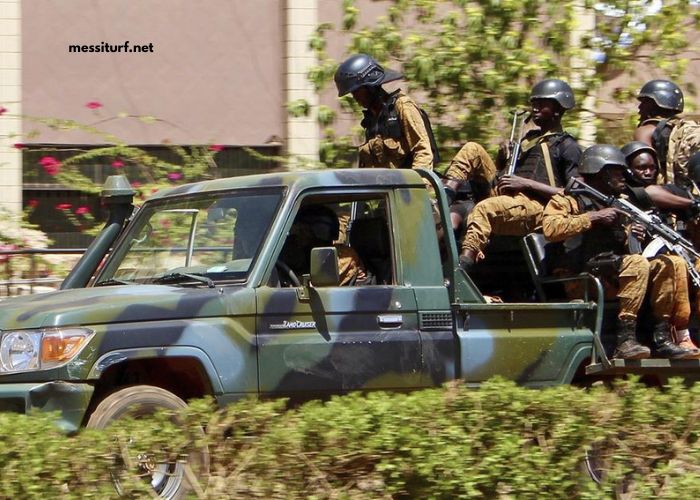In recent years, Burkina Faso has been experiencing escalating violence, with attacks occurring frequently across its borders. The country, located in the Sahel region of Africa, has faced a significant rise in terrorist activities, often involving armed groups with links to extremist organizations. Attaque Au Burkina Faso Aujourd’hui refers to the current wave of attacks and security situations affecting both civilians and military forces. This article will delve into the details of such attacks, their impacts, and the broader implications for the country’s stability and the international community.
Today, Attaque Au Burkina Faso Aujourd’hui represents not just a local tragedy but a broader regional security crisis. The violence, primarily in the northern and eastern parts of the country, has led to widespread displacement and a growing humanitarian crisis. Understanding the root causes of these attacks, their frequency, and the responses from the Burkina Faso government and international partners is essential to comprehending the full scope of the ongoing violence in the region.
What Is the Nature of the Attacks in Burkina Faso?
Attaque Au Burkina Faso Aujourd’hui typically involves coordinated assaults by armed groups targeting both military and civilian populations. These attacks are often attributed to various jihadist factions linked to al-Qaeda and ISIS, groups that have exploited the country’s weak security infrastructure. The attacks usually take the form of ambushes, bombings, and raids, with armed groups seeking to destabilize the government, disrupt local economies, and create widespread fear.
The northern and eastern regions of Burkina Faso are particularly vulnerable, with groups exploiting the vast ungoverned spaces to carry out their operations. These regions have become battlefields where civilians and security forces are frequently caught in the crossfire. The attacks are often indiscriminate, targeting villages, roads, and military convoys, leading to high civilian casualties and widespread destruction.
The scope of these attacks has grown over time, with incidents occurring on a daily basis, highlighting the escalating insecurity in the country. Attaque Au Burkina Faso Aujourd’hui is not just a reflection of isolated incidents but rather a broader pattern of persistent violence that has become a major concern for national security and international peacekeeping efforts.
What Are the Causes of the Attacks in Burkina Faso?
The root causes of Attaque Au Burkina Faso Aujourd’hui are complex and multifaceted. One of the primary drivers is the growing presence of extremist groups in the Sahel region, particularly in Mali, Niger, and Burkina Faso. These groups, seeking to establish control over large swathes of territory, have used violence and terror as tools to exert influence and challenge the authority of governments.
In addition to these external actors, internal factors also contribute to the attacks. Burkina Faso’s political instability, compounded by economic challenges and a lack of effective governance in certain regions, has created a fertile ground for radicalization and recruitment by extremist groups. The porous borders with Mali and Niger make it easier for militants to cross into Burkina Faso and carry out their operations with relative impunity.
Moreover, the weak presence of the state’s security apparatus in some areas has further fueled the crisis. The government has struggled to assert control over its entire territory, and local militias have often taken matters into their own hands. This lack of state presence has allowed extremist groups to exploit local grievances and create alliances with disaffected populations, deepening the crisis.
Attaque Au Burkina Faso Aujourd’hui is not simply about terror attacks but reflects broader systemic challenges that require coordinated responses from both the government and the international community.
How Is the Government Responding to These Attacks?
In response to Attaque Au Burkina Faso Aujourd’hui, the government has implemented several strategies aimed at combating the growing violence. One key approach has been the deployment of military forces to combat the armed groups responsible for the attacks. The government has also relied on international support, particularly from France, which has maintained a military presence in the region through Operation Barkhane, a counterterrorism operation designed to assist Sahelian countries in combating extremist groups.
Despite these efforts, the government’s response has often been criticized for its ineffectiveness in stemming the tide of violence. The military, although well-equipped, has been stretched thin, and the vast terrain of Burkina Faso poses significant logistical challenges. Furthermore, the rising number of internally displaced persons due to Attaque Au Burkina Faso Aujourd’hui has strained the country’s resources and infrastructure, making it difficult for the government to provide adequate humanitarian aid.
Another challenge for the government is the erosion of trust between the state and local communities. In some regions, civilians view the government and security forces with suspicion, believing that the state is either unable or unwilling to protect them from attacks. This perception has made it difficult for the government to gain the cooperation of local populations in combating insurgents.
How Has the International Community Reacted to the Attacks?
The international community has been deeply concerned by the increasing frequency of Attaque Au Burkina Faso Aujourd’hui. Various international organizations, including the United Nations and the African Union, have condemned the attacks and expressed solidarity with the people of Burkina Faso. Furthermore, France and other European nations have continued to provide military assistance and training to the Burkinabe armed forces.
The response from international peacekeeping forces has been multifaceted. The United Nations has deployed peacekeeping forces to assist with stabilizing the region and providing humanitarian aid to those affected by the violence. Additionally, the international community has pushed for regional cooperation among the Sahelian countries to improve security and prevent the spread of extremist ideologies.
One of the most significant international initiatives has been the G5 Sahel Joint Force, a collaborative military effort involving Burkina Faso, Mali, Niger, Chad, and Mauritania. This force aims to combat terrorism and organized crime across the region. However, while international support has been essential, the overall effectiveness of these efforts remains in question, given the complexity of the security situation.
What Are the Humanitarian Impacts of Attaque Au Burkina Faso Aujourd’hui?
The humanitarian consequences of Attaque Au Burkina Faso Aujourd’hui are severe. The attacks have led to the displacement of thousands of people, forcing them to flee their homes and seek refuge in other parts of the country or in neighboring nations. According to reports, over a million people have been displaced by the violence, and the number continues to grow as attacks intensify.
In addition to displacement, the attacks have caused widespread suffering among civilians. Villages have been destroyed, agricultural production disrupted, and essential services, including healthcare and education, have been severely affected. Humanitarian organizations are struggling to provide food, shelter, and medical care to those in need, with access to many affected areas being limited by ongoing violence.
Furthermore, women and children are often the most vulnerable during such attacks. In some cases, insurgents have taken advantage of the chaos to abduct children, while women have faced sexual violence and exploitation. The toll on the mental and physical well-being of the population is immeasurable, with many people enduring trauma and displacement without the support they need to recover.
What Is the Outlook for the Future of Burkina Faso?
The future of Burkina Faso remains uncertain in light of Attaque Au Burkina Faso Aujourd’hui. The country faces significant challenges in terms of security, governance, and humanitarian needs. While the government is committed to fighting extremism and restoring stability, the growing influence of armed groups and the spread of violence in neighboring countries complicate efforts to end the conflict.
The international community has a crucial role to play in supporting Burkina Faso through both military and humanitarian assistance. However, a lasting solution will require comprehensive peacebuilding efforts, including addressing the root causes of radicalization and improving the socio-economic conditions that fuel unrest. It will also require strengthening governance structures and ensuring that local populations feel secure and supported by the state.
Ultimately, the future of Burkina Faso depends on the country’s ability to unite its people, rebuild trust in government institutions, and develop a coordinated approach to tackling extremism. The path forward is undoubtedly challenging, but with sustained international support and a focus on long-term peacebuilding, there is hope for a more secure and stable future.
Conclusion
Attaque Au Burkina Faso Aujourd’hui represents a critical moment in the country’s history, as the violence continues to escalate and affect the lives of countless civilians. The government’s response, while robust in some areas, faces significant challenges due to the scale and complexity of the violence.
International support is essential, but ultimately, a long-term solution will depend on addressing the root causes of the violence and building stronger governance structures. The humanitarian impact of the attacks is devastating, and the outlook for the future requires both immediate action and long-term commitment to peace and stability.




